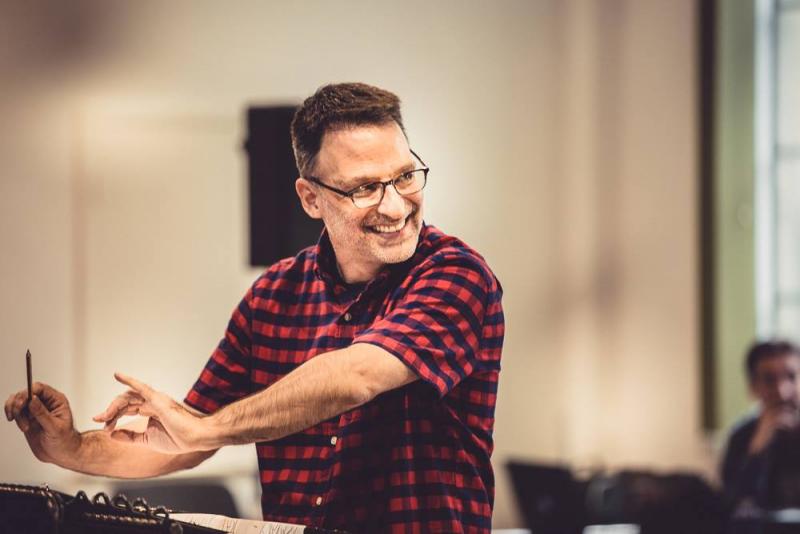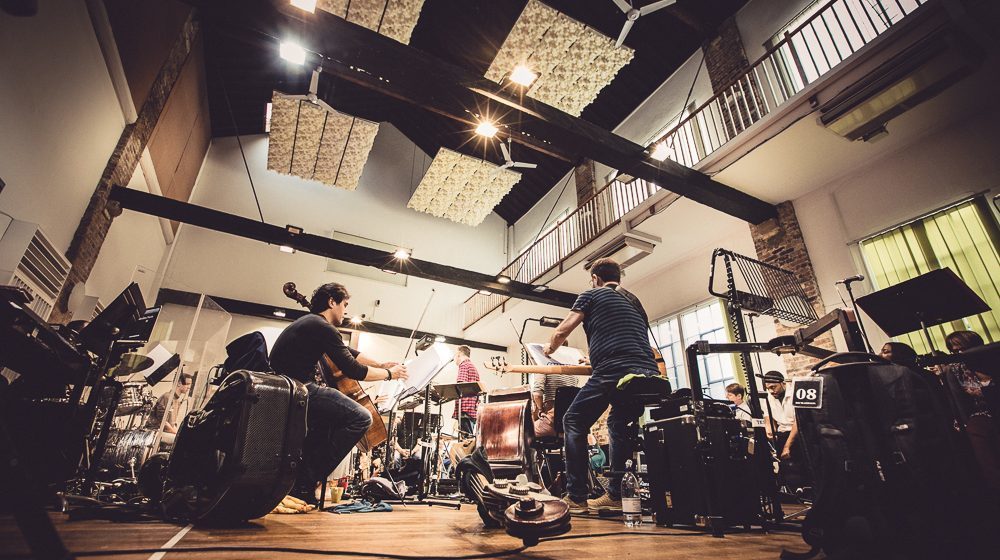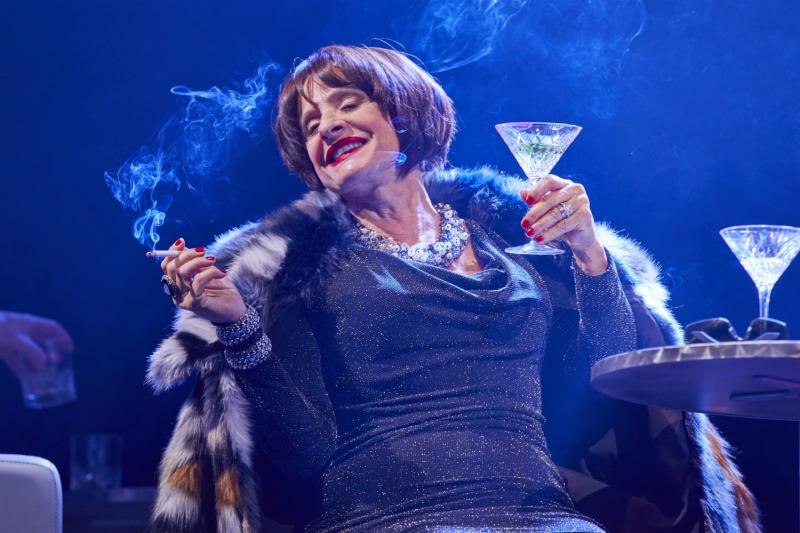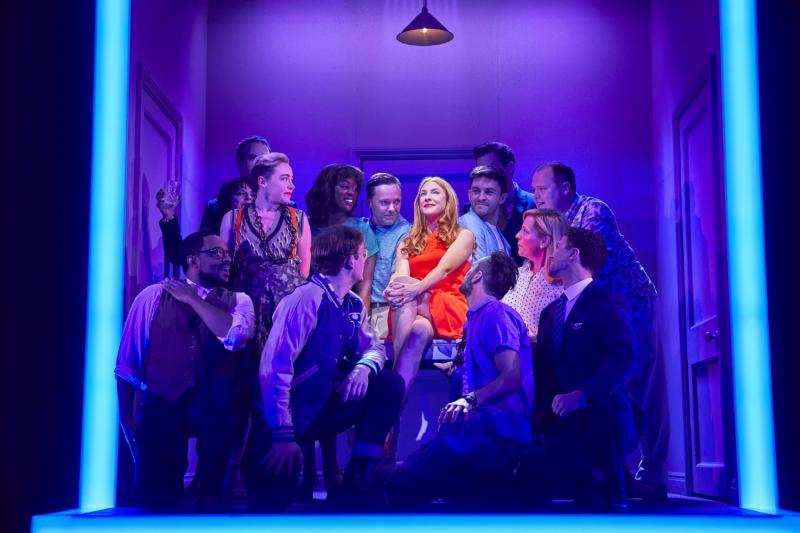Interview: Musical Director Joel Fram Talks COMPANY

for Company
Growing up, Joel Fram remembers the first time he encountered one of the "revolutionaries" of musical theatre, through the soundtracks of Stephen Sondheim. Today, Joel is the Musical Director and conductor of Marianne Elliott's acclaimed production of Company. And in a week's time, the very soundtrack he listened to growing up (and which he worked on with Sondheim himself last year) will drop.
With two months of the run left, Joel speaks to us about developing the show with Elliott, how it continues to change across the run, and working with the very special Company of Company.
Was theatre a large part of your life growing up?
Absolutely! I grew up in Houston, Texas, and not only did we get these big touring shows coming through, but we had (and still have) an amazing musical theatre producing organisation called Theatre Under the Stars. My parents were very good about taking us to see things. After all, they met at a performance of Stop the World, I Want to Get Off (definitely a harbinger of things to come).
No way!
My Dad had tickets to see Stop the World and had invited my aunt and her husband, but my uncle decided at the last minute he wasn't going. Never one to waste a ticket, my dad asked my aunt to invite someone - so she invited a friend of hers from university: my Mum. And that's how my Mum met my Dad.
I wouldn't be here if it weren't for Anthony Newley and Leslie Bricusse (who wrote Stop the World) - so it was inevitable that musical theatre would be in my blood.
Do you have a particularly early memory of theatre?
Growing up, I was glued to the radio - I knew every song in the weekly Top 10. It was the first and last time I was ever so profoundly in touch with contemporary pop music.
I remember my parents had this great record collection, and tucked away amongst the Johnny Cash and Hi-Lo's records were three albums: Stop the World (in honour of their first date), Camelot, and My Fair Lady. I had never seen a cast album before - they opened out, and each had pictures and a booklet. I put one on and thought, "What is this amazing thing from this faraway world called 'Broadway'?"
That was definitely before the internet, so cast albums were my only connection to this fantastic world. After that, there was no turning back - I had to learn more.
After those three shows, presumably Sondheim didn't come too far after?
Exactly. Someone told me, "Oh, My Fair Lady and Kiss Me Kate - those are 'golden age' musicals. But there are revolutionaries, like Stephen Sondheim. You should hear him, too!"
So I went out and bought as many of his albums as I could find. At the time, that meant Company and Follies and A Little Night Music and Sweeney Todd. I remember the day my friend Jimmy played me the Merrily album and said, "You'll never believe it - the show goes backwards. And so does the score!"
Now it's several decades later, and the remarkable thing is Sondheim is just as revolutionary and relevant as when he first wrote those scores. And he continues to write - he has a new musical in the works even now as we speak.

So growing up, you listened to that cast album of Company in your bedroom. And now, you're working alongside Sondheim himself on the same show and making an album together too! What's it been like to work alongside him throughout this process?
He is such a generous artist. Throughout this journey, he has been willing to re-examine and rewrite certain moments to help Marianne [Elliott] and I clarify our work on the show.
He would have every right to say, "Actually, I've already done quite a lot in my life - so thanks, but I'm good. The show is the show." But he is still willing to engage, to re-think and to challenge - he still cares deeply and seems to welcome collaboration.
Also, he has the sharpest ears of any person I have ever met - he can hear the smallest detail in the orchestration or a singer landing on a wrong note from across Shaftesbury Avenue! His notes are both beautifully articulated and very specific - so of course, attention must be paid.
It's great that he's been involved throughout the process. Rosalie [Craig] mentioned she had been involved for about two years, is that similar to how long you also?
Yes. I remember Marianne, Rosie and I getting together in my flat, saying, "Okay, we need to make certain decisions. What ramifications will they have on George [Furth] and Stephen's original ideas?" Knowing we were going to have to discuss these things with Stephen, we had to be clear what we would gain by making them, while still honouring their work.
For example, should there be gay couples as well as straight couples? Which ones? Would that make the musical feel more modern? If nowadays we are less comfortable with the portrayal of a 'ditzy' female flight attendant - do we feel comfortable with a ditzy male one? What would happen if we gave Peter's lines to Susan and Susan's lines to Peter? How does that change the dynamic of their relationship?
It was incredibly important to articulate what those changes would say to an audience - and most importantly, why in 2019 we might relate even more strongly to a female Bobbie.

As well as being the Musical Director on this journey, you also serve as conductor. So every night, you get to create those iconic songs and listen to them come to life. (Side note: I don't know how you do that, all I'd want to do would be to just watch and listen to it!)
I hear you - I just want to watch and listen, too. Partly because this is such a well-written show, and partly because we have an extraordinary cast who bring new insights to the work every single night - I just want to see what journey the show is going to take on any given performance.
What does conducting ask of you, in this role?
Every minute you are making a decision: how do I time the up-beat tonight? How fast is the number going to go? How long does Patti [LuPone] want to hold that final note of 'The Ladies Who Lunch'?
Your ears and your eyes are constantly open to what the performers are doing, and you must participate in that as well as lead it. So in a way, you can't just be a fan of the musical (although I am such a fan of this musical) or just be a fan of this production (although I am definitely a fan of this production). Your job is to be actively watching and listening and staying fully engaged, because you are literally creating something new with every gesture of the baton.
Talking about "watching" the show, the orchestra and yourself sit above the stage. What is your visibility like?
Ha, good point!
The performers have conductor monitors on the circle rail, and I have a small monitor of the stage next to my music stand. It's a strange combination of hawk-like watching and ESP.
For example, the other day Ben Lewis mentioned the lyric "Wait, I think I meant that in reverse." He had been playing with the idea of taking a puff on his cigarette just before the line, and he asked me, "Can you follow me?" I said, "Well, I can't see you in my monitor - but let's try!" (P.S. I shouldn't even be telling you this story because I'll probably jinx it by talking about it out loud.)
*Knocks on wooden dressing room table*
Thanks!
But somehow, we've managed to do it together even though we can't see each other. There really is a kind of miraculous telepathy we've all developed over the run. (More knocking on wood.)
The run is starting to wind down now, with just over two months left. What has it meant to be here at the Gielgud and a part of this team?

I can tell you how it feels: glorious.
First of all, it's a beautiful theatre with an amazing staff that makes us feel welcome every day. We are also blessed with the best stage and Company management team - they take such good care of us and of the show.
But one of main reasons this job is such a pleasure is our fantastic orchestra. I worked with the brilliant fixer Maurice Cambridge for months putting this group together. Every day I look around at this band and think how much I love each and every person in it - first, because they are great people and secondly, because they play exquisitely. And you can hear how carefully they listen to each other - it has the drive of a Broadway show with the delicacy of chamber music.
None of which would be possible without the brilliant new orchestrations by David Cullen. He is an absolute hero of mine, and I have always wanted a chance to work with him. He gave our show its unique sound while honouring Steve's iconic score.
Imagine - working with David, Marianne, and Steve - three theatre legends - all on a single show! Now that is a dream come true.
Company at the Gielgud Theatre until 30 March, 2019
Read our interviews with Rosalie Craig, and Jonathan Bailey and Alex Gaumond
Check out our review of Company
Photo credit: Brinkhoff/Moegenburg


